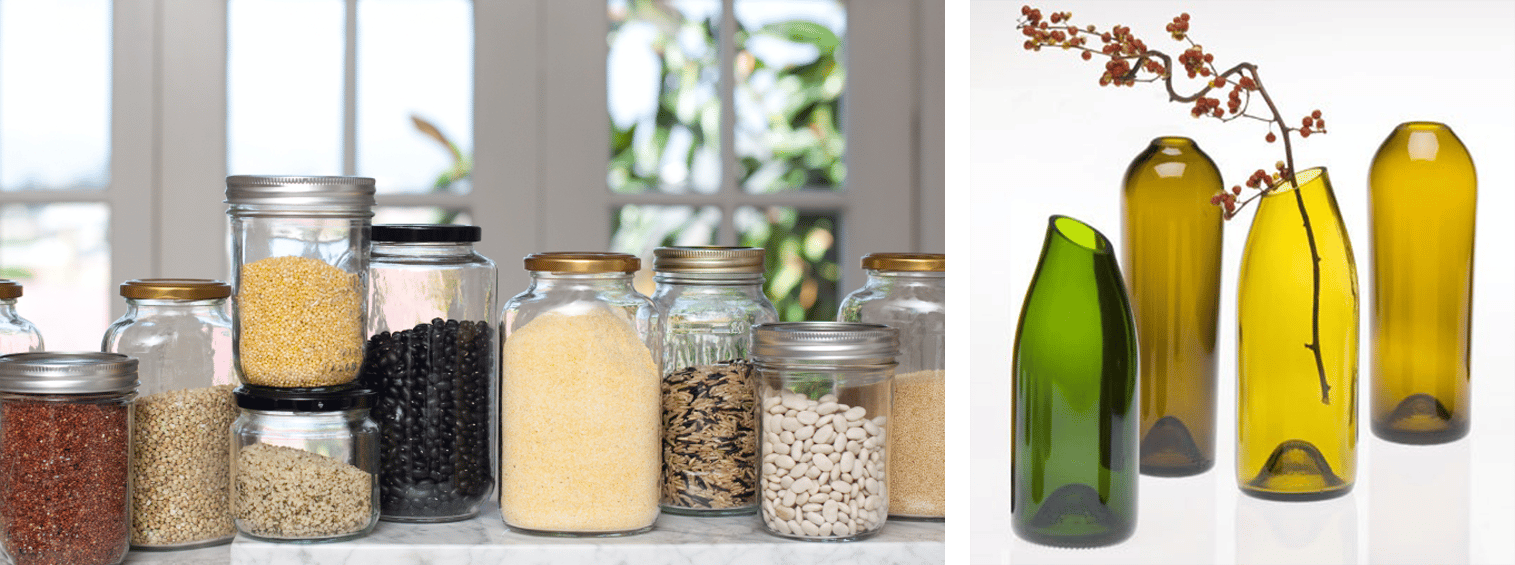Contact us today for your Free Quote
In the UK, we generate approximately 222.2 million tonnes of waste a year.
The second of September commences Zero Waste Week, the award-winning annual awareness campaign founded by Rachelle Strauss in 2008. The week highlights means and methods we can take to reduce waste.
This Zero Waste Week, we’re celebrating by looking at simple, actionable ways to cut down on the amount of waste we produce. Reusing everyday items is a simple change that can have a huge impact on our planet.
How to reduce glass waste
In the UK, we currently recycle around 70% of all glass containers, such as bottles and jars. However, Switzerland and Finland far exceed our efforts, recycling a whopping 90% of their glass containers. Unfortunately, even recycling glass has its flaws. Glass still needs to be transported to recycling plants, which can contribute to increased carbon emissions (when not using our state-of-the-art Electric Dustcart). So instead of recycling glass, why don’t we reuse it and embrace a more sustainable approach?
Once you have finished your delightful store-bought sauce or bottled wine, wash it, and transform it into something functional or aesthetically pleasing – Here are some examples:

How to reduce clothes waste
More clothes are being made, bought, and thrown away than ever before – clothing production has doubled since 2000, with people buying 60% more garments recently than they did at the turn of the millennium. The fashion industry currently accounts for 10% of humanity’s total carbon emissions, that’s more than all international flights and maritime shipping combined.
In this current global climate, it is imperative that we do our part in reducing waste and conserving the earth’s precious resources. One way we can contribute to this effort is by recycling our clothes. Donating clothes to charities like Oxfam or the British Heart Foundation not only helps to reduce the amount of textile waste in landfills, but it also supports a great cause.
To be more sustainable, why not reuse or alter the clothes you have? The material from your clothes is very versatile and can be made into any new garment or accessory. Healthline has created an excellent guide on how you can convert your old clothes into a usable facemask.
Donate your clothes to the less fortunate or your friends and family to reduce waste. More than half of those surveyed by ‘The Times’ admitted throwing away perfectly wearable garments rather than salvaging them for future use or donating them to friends, family, or charity shops.
How to reduce food waste
Each year, the UK throws away an estimated 9.5 million tonnes of food, half of which could have been eaten. This costs the average household hundreds of pounds a year and contributes to greenhouse gas emissions. You can tackle this issue and practice food waste reduction by being mindful of what you buy and using it before its use-by date.
How to reduce food waste? Food can be reused if it is treated well. We recommend you freeze your food by its use-by date if you aren’t going to eat it any time soon. Certain leftovers can also be frozen if appropriately stored or be turned into your next delicious meal using BBC’s leftover recipes.
At the supermarket, we tend to buy too much. You can practice portion control to reduce food waste, and if you have bought too much, why not donate your excess food to a food bank where you can help someone less fortunate? For a broader community approach to zero waste, consider donating to an organisation like FoodCycle or FareShare, which both redistribute surplus food across the UK.
How to reduce Furniture waste
One person’s trash is another person’s treasure. Your old furniture and electronics can be given a new life. Through our partnerships with organisations like ReYooz, we can ensure that all reusable items find new homes with UK businesses or charities. In 2023, 161,105 Kg of Waste was saved from Landfill, saved 213,884 Kg of carbon emissions and donated £514,274 for good causes.
You can also try selling your old furniture and electronics online using marketplaces like eBay and Facebook. Another great option is to donate your items to a local charity like Sue Ryder or St Vincent de Paul Society.
How to reduce Plastic waste
Many of us accumulate a lot of plastic containers from food and household products. Before you recycle them, consider creative ways to reuse them at home. Yogurt pots can be used as starter containers for seedlings in your garden, while larger containers can be used to organise nuts and bolts in a workshop or toys in a child’s room. For more inspiration on how to get creative with your plastics, check out WWF-UK’s guide to reducing your plastic footprint. Reusing these plastics at home extends their life cycle and reduces the need to purchase new containers, making it a great way to boost your zero waste efforts.
Reusing everyday items is a simple yet powerful way to contribute to a more sustainable future. By making small, mindful changes to how we handle our glass jars, clothes, food, furniture, and plastic containers, we can collectively reduce waste and conserve valuable resources. This Zero Waste Week, let’s embrace the challenge of giving our items a second life and inspire others to do the same.


